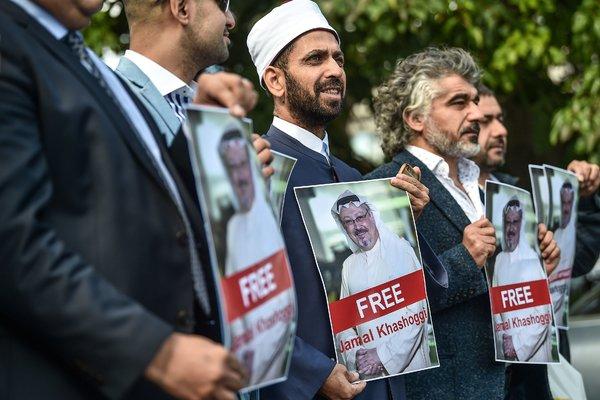This post has already been read 2343 times!
Forensic experts seem to have discovered more disturbing evidence signifying that Saudi journalist Jamal Khashoggi was murdered at Saudi consulate in Istanbul Turkey.
The team has taken soil samples, bricks and other evidence from the Saudi consulate in Turkey after a comprehensive search of the premises and its Consular General’s residence in Istanbul.
Evidence that walls inside the Saudi consulate were repainted – literally covering something up – was shown to journalists last week, where Jamal Khashoggi was last seen.
A Turkish source has told CNN and Al Jazeera that Khashoggi’s body was cut into pieces after his death at the Saudi consulate in Istanbul two weeks ago.
The source told Al Jazeera that the murder took about seven minutes and said that Saudi forensics expert Saleh al-Tubaiqi dismembered Khashoggi’s body and asked his colleagues to listen to music while he did it.
Turkey had earlier claimed that a team of 15 Saudis flew into Istanbul to kill Khashoggi and said that there was an audio and video recording from inside the building to prove that he had been killed there, but no further details had been made public.
A team of investigators searched the building for nine hours on Monday and Turkish President Recep Tayyip Erdogan said that some “toxic materials” in the consulate had been “painted over” before investigators got inside.
A “high level” official told the AP earlier that police had found “certain evidence” of the killing after the search.
Khashoggi, a journalist who wrote columns critical of Riyadh for the Washington Post, entered the consulate on Oct. 2 to obtain documents for his planned marriage to Turkish fiancée, Hatice Cengiz.
Riyadh has denied involvement with the killing, but reports in U.S. media on Monday suggested that the kingdom might be preparing to admit that the journalist was killed in an unsanctioned interrogation gone wrong.
The U.S. has therefore asked Turkey for the recording said to provide strong evidence that Khashoggi was killed at Istanbul’s Saudi consulate.
“We have asked for it, if it exists,” President Donald Trump told reporters at the White House.
Mr Khashoggi has not been seen since entering the building on Oct. 2, and Saudi Arabia has denied killing him.
Meanwhile, the Washington Post has published the last column Mr Khashoggi wrote before his disappearance.
In the column he talks about the importance of a free press in the Middle East.
The newspaper’s Global Opinions editor Karen Attiah said its release had been delayed in the hope that Mr Khashoggi would return safely.
“Now I have to accept: That is not going to happen. This is the last piece of his I will edit for The Post.
“This column perfectly captures his commitment and passion for freedom in the Arab world. A freedom he apparently gave his life for,” she wrote
Mr Khashoggi presented a strong criticism of the state of press freedoms in the Arab world: “The Arab world is facing its own version of an Iron Curtain, imposed not by external actors but through domestic forces vying for power.
“The Arab world needs a modern version of the old transnational media so citizens can be informed about global events. More important, we need to provide a platform for Arab voices.”
He mentioned the case of his fellow Saudi writer, Saleh al-Shehi, who he said “is now serving an unwarranted five-year prison sentence for supposed comments contrary to the Saudi establishment”.
“Such actions no longer carry the consequence of a backlash from the international community,” he wrote. “Instead, these actions may trigger condemnation quickly followed by silence.”
Read more: BBC/NAN



